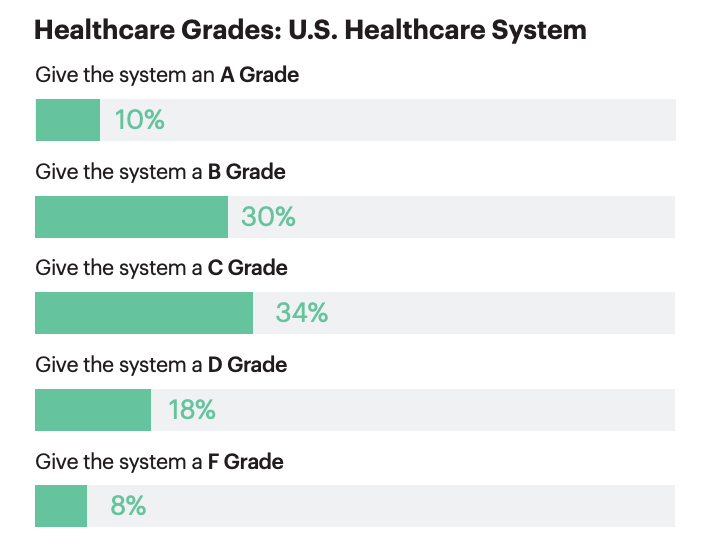Weekly Data
WHAT THE DATA SAY: Most Americans say U.S. healthcare system fails them
By: Ray Day
CONTACT:
We wanted to share our latest consumer and business insights, based on research from Stagwell. Among the highlights of our weekly consumer sentiment tracking (fielded May 12-14):
WORRIES ABOUT ECONOMY MODERATE; JOB CONCERNS RISE
Today, 85% of Americans are concerned about the economy and inflation – down 1 point from last week and higher than December’s 82% rate.
- 80% worry about U.S. crime rates (down 2 points from last week)
- 80% about a potential U.S. recession (down 1 point)
- 75% about political divisiveness (down 2 points)
- 72% about affording my living expenses (up 5 points)
- 70% about the War on Ukraine (up 1 point)
- 50% about a new COVID-19 variant (down 4 points)
- 51% about losing their jobs (up 5 points)
PARENTS SEE DRAWBACKS OF WORK-FROM-HOME
Many parents are rebelling against remote work, finding serious drawbacks, according to our survey with Bright Horizons.
- 41% of parents say that, when they work from home, they often go days without leaving their house.
- 33% “feel very isolated” when working remotely.
- 8 in 10 parents who work at least part-time remotely juggle jobs with their family responsibilities during the workday – 47% running kids to activities and 44% helping with homework.
- 35% of work-from-home parents also believe their hybrid schedule negatively affects their careers.
- 40% would like their managers to advise them on how much time they should be in the office.
SCHEDULING APPOINTMENTS AND HIGH COSTS WEIGH DOWN HEALTHCARE REPORT CARD
Most Americans only give the U.S. healthcare system a C grade, and many do not believe the system is meeting their needs, according to our study with the American Academy of Physician Associates.
- A quarter of adults feel that, at a high level, the system is “broken” – with 26% giving the U.S. healthcare system a D (18%) or an F (8%) grade, and only 10% giving it an A grade.
- Those who are on Medicare (17%) or Medicaid (12%) are most likely to give an A grade versus those with private insurance (7%).
- Reasons for the dissatisfaction include: takes too long to schedule an appointment (31%); high costs (26%); insurance does not fully cover costs (23%); lack of focus on preventative care (19%); and not enough local providers (13%).
- 56% say they wait more than a week for an appointment.
- All of this has resulted in 44% skipping or delaying healthcare services in the past two years – most problematic among adults 35-49 (54%), adults 18-34 (53%) and Latino Americans (53%).
- The top reasons for delaying or skipping visits include: costs (40%); lack of time (30%); not feeling the health issue is severe enough (27%); and too long to book an appointment (25%).
SOCIAL MEDIA IMPORTANCE EXPECTED TO GROW
Four in 10 business leaders expect their social media budget to increase at least 50% in the next three years – particularly for reputation building, connecting better with customers and predicting future trends. Key insights from our study with Sprout Social of marketing, customer care and communications professionals in the U.S. and UK include:
- The highest impact of social media on business priorities include building reputation (55%), connecting with customers (51%), competitive positioning (46%), predicting future trends (45%) and moving the business forward with reduced budgets (34%).
- 30% expect a significant increase in social media use in their business during the next three years, and 58% expect a moderate increase. Fewer than 2% expect a decline.
- 69% say social media data and insights currently are underutilized at their company.
- Challenges preventing companies from more effectively using social media data and insights to inform business decision-making include: limited access to social data tools (42%), lack of integration with other technology solutions (42%) and lack of qualified team members who know how to use the tools (39%).
- Business leaders overwhelmingly agree that AI will enable companies to better analyze social media data and insights. Greatest benefits of AI and social media together are expected to be behavioral segmentation (49%), predictive analytics (45%) and dynamic pricing (45%).
- The top three departments with the greatest influence on a company’s social media strategy are marketing (79%), customer care (57%) and communications (51%).
ICYMI
In case you missed it, check out some of the thought-leadership and happenings around Stagwell making news:
- New data on the writers’ strike and use of AI in Hollywood
- Americans born between 1965 and 1980 are concerned that Social Security won’t be there to support them in retirement.
- I used ChatGPT to write a cover letter and pretty much fooled 3 experts
- A New Antitrust Era is Coming. Here’s How You Weather the Storm.
Related
Articles
In the News, Investments & Financials, Press Releases, Talent & Awards
Jul 08, 2025
Stagwell (STGW) Advances Executive Team with Four Key Appointments

In the News, Press Releases, Thought Leadership
Jun 10, 2025
Stagwell (STGW) Chairman and CEO Mark Penn to Discuss the Irreplaceable Power of Human Creativity on the Main Stage of Cannes Lions

Events, In the News, Press Releases, Talent & Awards
Jun 05, 2025
Code and Theory Named ANA B2B Agency of the Year After Transforming the World’s Leading Brands






